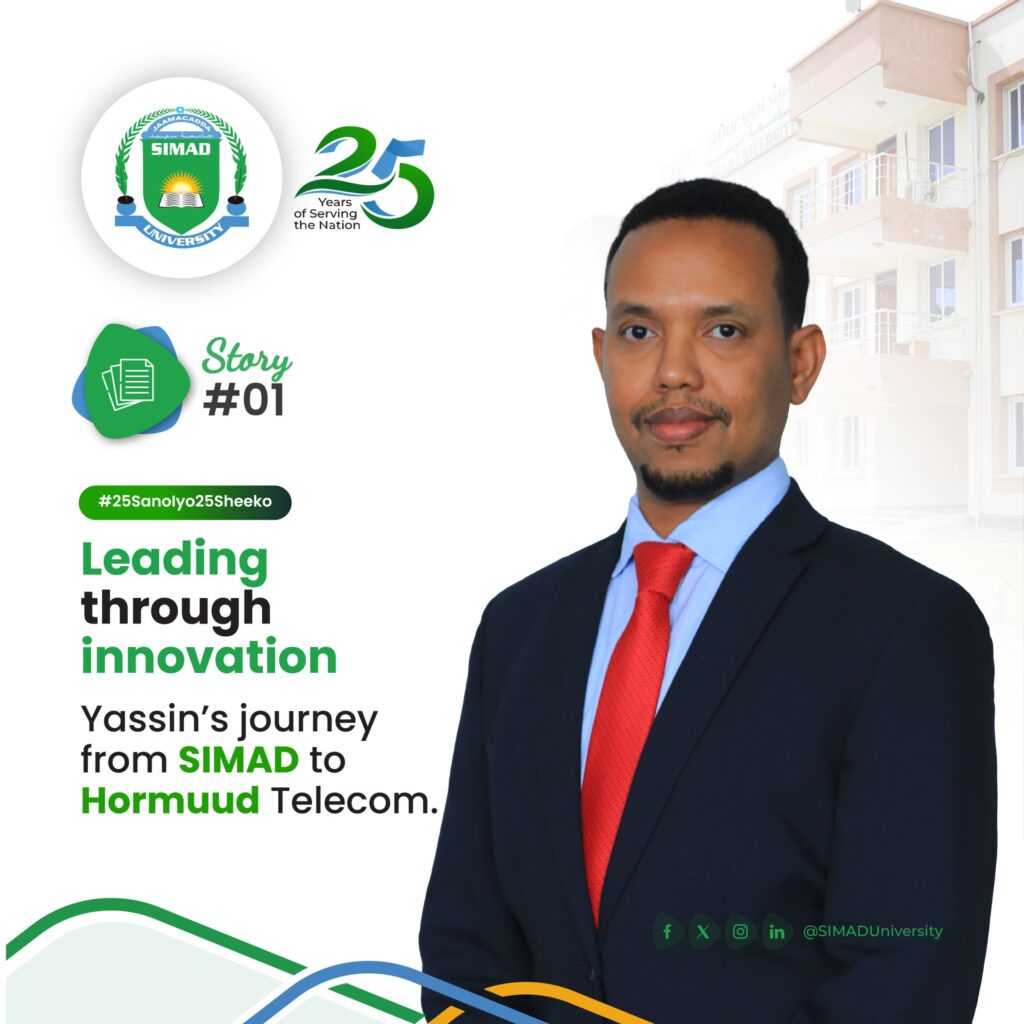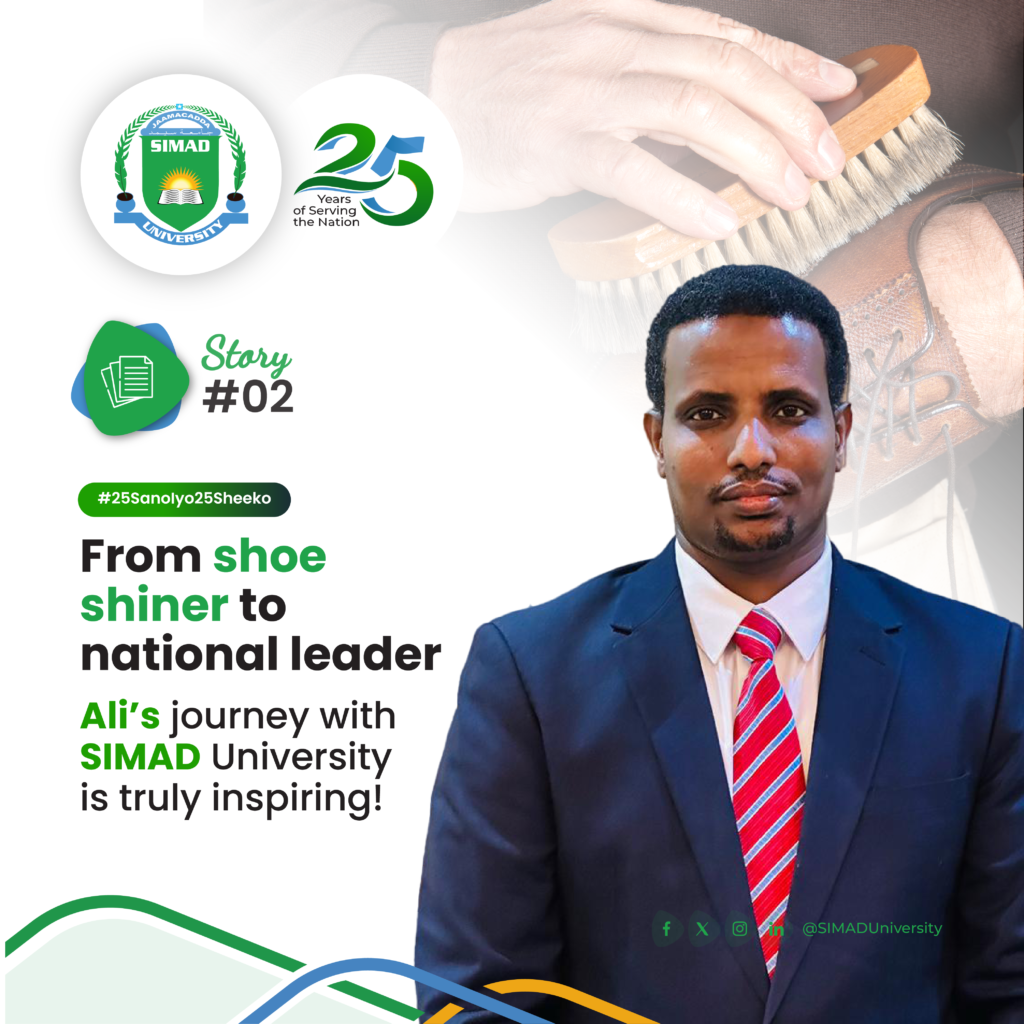Abdulkadir Mohamud Ibrahim’s career reflects both personal perseverance and a deep-seated commitment to humanitarian work. Today, as the Resilience Program Coordinator at Concern Worldwide, Abdulkadir oversees large-scale projects designed to build resilience in Somalia. His journey began at SIMAD University in 2008, when the institution was still in its formative stages, and it has continued to evolve alongside the changing landscape of Somalia itself.
Graduating from SIMAD 16 years ago, Abdulkadir recalls a very different learning environment than the one students experience today. When he began, SIMAD was an institute, not yet a full university. Resources were limited, and the faculty was a blend of international professors from countries like Pakistan, India, Uganda, and Kenya. Abdulkadir describes the challenges of studying during a period of political instability, when safety was a daily concern, and campuses were often makeshift, with classes held in safer areas of the city. Despite these hardships, he speaks of his time at SIMAD with admiration, noting how much the institution has grown. “Students at SIMAD today are lucky to have extensive facilities, including large libraries,” he says, acknowledging the investments that have transformed SIMAD into a prominent university.
After graduating, Abdulkadir joined Concern Worldwide, an Irish humanitarian organization, where he began his career as a junior administrative assistant. Balancing work and study had not been easy, but his time at SIMAD had prepared him to adapt and grow in this demanding field. Over the years, he worked his way up, motivated by a sense of social responsibility and a desire to contribute to a country struggling with fragile governance and widespread need. “I felt a social responsibility to contribute to a country in a fragile state,” he shares. Many of his role models were in humanitarian roles, and Abdulkadir saw this sector as a space where he could make a meaningful impact.
Today, as Program Coordinator, he manages large grants aimed at building resilience within communities. His work involves overseeing various initiatives that support vulnerable populations, aligning with his goal to contribute to a sustainable, stable future for Somalia.
Reflecting on the influence of SIMAD, Abdulkadir credits the university for setting him on a path he hadn’t initially foreseen. “SIMAD played a key role in my career path,” he states, adding that the respect SIMAD graduates receive in the professional world opened new doors for him. His success has led him to pursue a master’s degree at the United States International University in Nairobi, where SIMAD’s reputation continues to bolster his academic and professional journey. He believes SIMAD graduates are well-prepared to succeed alongside peers from more stable regions, a testament to the quality of education at the university.
Although his role with Concern Worldwide is demanding, Abdulkadir remains connected to the SIMAD alumni network, which he finds to be a vibrant and supportive community. “Without SIMAD, my career path would have been very different,” he reflects, recognizing the foundational skills and network the university provided.
Abdulkadir sees SIMAD as an institution that contributes actively to the Sustainable Development Goals (SDGs). Many graduates, including more than ten colleagues he knows, are directly involved in SDG-related initiatives. SIMAD’s efforts in research, entrepreneurship, and sustainable development align closely with these goals, and Abdulkadir believes that further development in research and international partnerships would position the university as a leading force in academia and social impact.
He envisions a future where SIMAD continues to expand its research and development capabilities, particularly through collaborations with international universities. Exposure visits and exchange programs with institutions like University College London or Cape Town University, he suggests, could bring valuable insights and strengthen SIMAD’s standing. He credits the university’s young, motivated leadership for driving these advancements and believes that SIMAD’s investments in returning scholars will be pivotal to its growth over the coming decade.
Abdulkadir’s journey underscores the role of education in empowering individuals to contribute meaningfully to their communities. His story is one of resilience, from navigating the challenges of studying in a conflict-ridden city to advancing in the humanitarian field and becoming a leader in resilience building. Through his work, Abdulkadir not only impacts lives but also exemplifies the values SIMAD instills in its students—values of dedication, adaptability, and a commitment to community. Abdulkadir’s accomplishments reflect both his personal dedication and SIMAD’s mission to develop professionals who drive positive change. In every role, he carries forward SIMAD’s legacy, showing how education can be a force for good, even in the most challenging circumstances.


